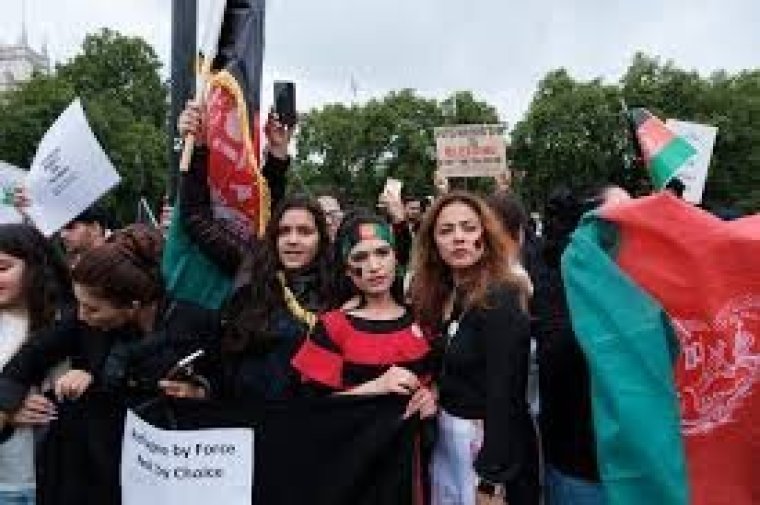
In the 15 months since the Taliban took control over the country, the group has suspended education for girls, rolled back the rights of women (women are now banned from parks and gyms) and brutally oppressed Christians. They have also squelched the media and the press.
Sharia law
Sharia is Islam's legal system.It is derived from the Quran, Islam's holy book, as well as the Sunnah and Hadith - the deeds and sayings of the Prophet Muhammad.
Where an answer cannot be derived directly from these, religious scholars may give rulings as guidance on a particular topic or question.
In Arabic, Sharia literally means "the clear, well-trodden path to water".
Sharia acts as a code for living that all Muslims should adhere to, including prayers, fasting and donations to the poor.It aims to help Muslims understand how they should lead every aspect of their lives according to God's wishes.
The head of the TalibanHaibatullah Akhundzada has decreed that Afghanistan’s judges are to mete out punishments in accordance with Sharia Law.His spokesman said offences such as robbery, kidnapping and sedition must be punished in line with the group's interpretation of Islamic Sharia law.
The exact crimes and punishments have not been defined by the Taliban, but one religious leader in Afghanistan told the BBC that under Sharia law, penalties could include amputations, public lashings and stoning.
Several people interviewed by The Washington Post said they or someone close to them had suffered torture at the hands of the Taliban. A Human Rights Watch report published this year described the Taliban justice system as one that is “focused on punishment and largely relies on confessions, often obtained by beatings and other forms of torture.”
Broken promises
When in power in the 1990s, the Taliban were condemned for such punishments, which included public executions.
They promised to rule more moderately when they retook power last year.
But since then the militant Islamist group has steadily cracked down on freedoms. Women's rights in particular have been severely restricted.
It has vowed there will be no brutal repression of women as there was when it was in power from 1996-2001, but half the population face severe curbs on what they can do.
Billions of dollars in Afghan assets held abroad are frozen as the international community waits for the Taliban to honour promises still to be met on security, governance and human rights.
Western diplomats have indicated to the Taliban that resuming development funding for a country in deep economic crisis depends on the treatment of women improving.
Repression of women
In May women were ordered to wear the Islamic face veil in public. A number of women have been beaten for demanding their rights.
Women are barred from going on longer distance journeys without a male chaperone. Teenage girls have still not returned to school in most of the country, despite Taliban promises to allow them to do so.
While some women still work in sectors such as healthcare and education, most were told not to go to work after the Taliban swept back to power.
The majority of ordinary Afghan families appear to now be in favour of female education.
A recent study by the World Bank found that there had actually been a rise in female primary school attendance since the Taliban takeover as security improved. Meanwhile, the group has allowed women to attend university as long as classes are segregated.
But today's decision to keep girls' secondary schools closed, appears to underline the gulf that still exists between the Taliban leadership and contemporary Afghan society.
Last week they banned women from visiting all parks in Kabul, excluding them still further from public life. It has since emerged the ban extends to women in the capital visiting public baths and gyms, although the latter attracted relatively few women.
Entry to parks, baths and gyms was already segregated under Taliban rules on segregating people by gender. The group claims Islamic laws were not being followed.
Given that Taliban officials believe there are “no Christians” in Afghanistan, every believer is regarded as an apostate from Islam. Traditionally, in Shariah law, leaving Islam has carried a potential penalty of death. This is the kind of punishment the Taliban is demanding from Afghanistan’s judges.
Even before the Taliban came back to power, Christian converts could be sentenced to death. In 2006, an Afghan named Abdul Rahman was charged with apostasy, and religious leaders in Afghanistan demanded his execution. The court said there were issues with the investigation, and Rahman was released and fled to a Western country, where he claimed asylum.
But under new laws, someone charged with apostasy would undergo more horrifying punishments with no sympathy from the courts.
Afghanistan is one of the hardest places to live if you are a Christian. It is particularly dangerous to meet with other Christians, let alone pray and worship.
Prayer
Creator God, thank you that you are still creating in the world. You are still working to bring light into the darkness, order into the chaos and making all things new. We ask you to brood over the chaos, darkness and death in the world, particularly this time in Afghanistan.
Speak into the darkness and shine light, intervene and bring life into the Muslims as well as the Christians. May your guardian angels protect the Christians and give them wisdom, clarity and courage, knowing that you are with them and will never leave them. Amen

Aira Chilcott is a retired secondary school teacher with lots of science andtheology under her belt. Aira is an editor for PSI and indulges inreading, bushwalking and volunteering at a nature reserve. Aira’s husband Bill passed away in 2022 and she is left with three wonderful adult sons and one grandson.
Aira Chilcott's previous articles may be viewed at http://www.pressserviceinternational.org/aira-chilcott.html